The Moral Psychology of Forgiveness
Moral Psychology of the Emotions
Series editor: Mark Alfano, Associate Professor, Department of Philosophy, Delft University of Technology
How do our emotions influence our other mental states (perceptions, beliefs, motivations, intentions) and our behavior? How are they influenced by our other mental states, our environments, and our cultures? What is the moral value of a particular emotion in a particular context? This series explores the causes, consequences, and value of the emotions from an interdisciplinary perspective. Emotions are diverse, with components at various levels (biological, neural, psychological, social), so each book in this series is devoted to a distinct emotion. This focus allows the author and reader to delve into a specific mental state, rather than trying to sum up emotions en masse. Authors approach a particular emotion from their own disciplinary angle (e.g., conceptual analysis, feminist philosophy, critical race theory, phenomenology, social psychology, personality psychology, neuroscience) while connecting with other fields. In so doing, they build a mosaic for each emotion, evaluating both its nature and its moral properties.
Forthcoming titles in the series:
The Moral Psychology of Pride edited by Adam J. Carter and Emma C. Gordon
The Moral Psychology of Sadness edited by Anna Gotlib
The Moral Psychology of Disgust edited by Nina Strohminger and Victor Kumar
The Moral Psychology of Contempt edited by Michelle Mason
The Moral Psychology of Anger edited by Myisha Cherry and Owen Flanagan
The Moral Psychology of Regret edited by Anna Gotlib
The Moral Psychology of Forgiveness
Edited by Kathryn J. Norlock

London New York
Published by Rowman & Littlefield International Ltd
Unit A, Whitacre Mews, 26-34 Stannary Street, London SE11 4AB
www.rowmaninternational.com
Rowman & Littlefield International Ltd.is an affiliate of Rowman & Littlefield
4501 Forbes Boulevard, Suite 200, Lanham, Maryland 20706, USA
With additional offices in Boulder, New York, Toronto (Canada), and Plymouth (UK)
www.rowman.com
Selection and editorial matter 2017 Kathryn J. Norlock
Copyright in individual chapters is held by the respective chapter authors.
All rights reserved . No part of this book may be reproduced in any form or by any electronic or mechanical means, including information storage and retrieval systems, without written permission from the publisher, except by a reviewer who may quote passages in a review.
British Library Cataloguing in Publication Data
A catalogue record for this book is available from the British Library
ISBN: HB 978-1-7866-0137-7
Library of Congress Cataloging-in-Publication Data Is Available
Names: Norlock, Kathryn, 1969- editor.
Title: The moral psychology of forgiveness / edited by Kathryn J. Norlock.
Description: Lanham : Rowman & Littlefield International, 2017. | Series: Moral psychology of the emotions | Includes bibliographical references and index.
Identifiers: LCCN 2017015123 (print) | LCCN 2017017232 (ebook) | ISBN 9781786601391 (electronic) | ISBN 9781786601377 (cloth : alk. paper)
Subjects: LCSH: Forgiveness.
Classification: LCC BJ1476 (ebook) | LCC BJ1476 .M663 2017 (print) | DDC 179/.9dc23
LC record available at https://lccn.loc.gov/2017015123
 The paper used in this publication meets the minimum requirements of American National Standard for Information SciencesPermanence of Paper for Printed Library Materials, ANSI/NISO Z39.48-1992.
The paper used in this publication meets the minimum requirements of American National Standard for Information SciencesPermanence of Paper for Printed Library Materials, ANSI/NISO Z39.48-1992.
Printed in the United States of America
Introduction
The Challenges of Forgiveness in Context
Kathryn J. Norlock
Of enduring interest to me over the years have been questions about moral agents responses in the aftermath of wrongdoing. The project of articulating the responsibilities of offenders, victims of harm, and witnesses to wrongs inevitably involves description of our moral and emotional capacities. When it comes to the moral psychology of forgiveness, questions as to what we can control and what is out of our control are important. Can we overcome inward feelings of anger, resentment, guilt, self-righteousness, indignation, schadenfreude, and defensiveness? How do moral choices to forgive affect the jumble of unexpected feelings after a wrongdoing? Further, the expectations of others, for example, the cultural expectation that women may be more forgiving than men, present external sources of the uncontrollable, complicating the possibilities for ethical recommendations to forgive or not.
Such preoccupations have informed my scholarship. Yet like many philosophers drawn to the topic of forgiveness, I have routinely encountered the following objection to a presentation or paper. Especially at those times when Im most gripped by moral issues arising from difficult experiences with serious harm or traumatic memories recurring long after a wrong, I net the following response from some philosophers: But thats psychology. The implication is that where there is psychology, one is not doing philosophy. Complications for ethical theory that stem from the limitations of human minds and bodies or the multiplicities of human experiences are seen by such objectors as, while unfortunate or painful, largely irrelevant to abstract idealizations of morality. At those times when philosophers have suggested that philosophical questions should not occur in an admixture with psychology, I have found that the interdisciplinary scholarship of forgiveness affirms me in my course. As psychologist Pumla Gobodo-Madikizela says in the first chapter of this volume, Philosophical questions such as the moral inappropriateness of forgiveness can and should give way and be subsumed to human questions, for in the end we are a society of people and not of ideas, a fragile web of interdependent human beings, not of stances. It is a recommendation consistent with what some philosophers call naturalistic ethics , the commitments of which include the belief that moral philosophy should not employ a distinctive a priori method of yielding substantive, self-evident and foundational truths from pure conceptual analysis.... Indeed, the naturalist is committed to there being no sharp distinction between her investigation and those of relevant other disciplines.
I was intrigued, as one such naturalist, when I was informed by series editor Mark Alfano that he invited proposals for anthologies in moral psychology including forgiveness. Given what Susan Dwyer has called the relative newnessat least among philosophersof thinking seriously about morality as involving a set of capacities that are amenable to empirical investigation, I was drawn to Alfanos description of the possibilities of volumes on particular moral emotions; he suggested that a volume could serve not as an encyclopedia or a handbook, but rather as a collection of perspectives, building a mosaic for each emotion and evaluating both its nature and its moral properties. The result of contributors efforts before you is not a compendium of all possible treatments of moral psychology and forgiveness; instead it is a collection of distinctive perspectives on empirically informed understandings of forgiveness. Selections appear in order from the more psychological or philosophically applied to the more philosophically abstract, but I hope readers will find, as I do, that they ultimately inform and enhance each other. The authors assembled here offer views that sometimes harmonize and at other times disagree with each other; I solicited their participation partly because I believe the juxtaposition of approaches is productive of new and better thinking about forgiveness. For the sake of proceeding with a rough understanding of the subject, I offer the following amalgam of authors accounts of the meaning of the term: they tend to converge on elements of forgiveness as a moral and therefore at least partly voluntary response to a wrongdoer that reflects commitment to or expresses a change in feelings about the wrong done and that (re)accepts the offender as a member of a moral community.
Next page
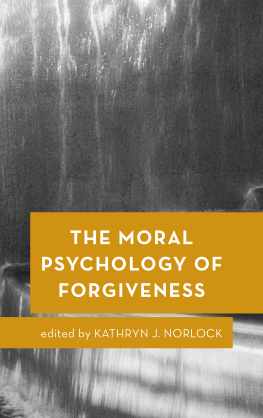

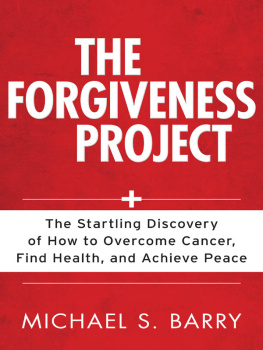

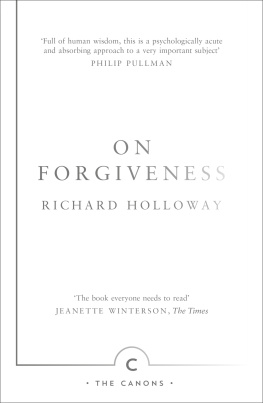



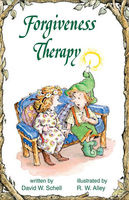
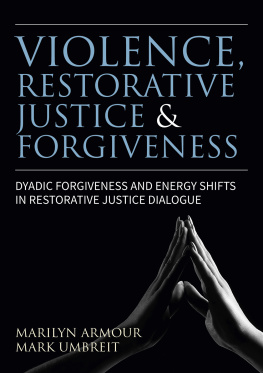
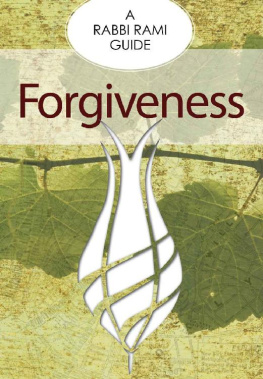


 The paper used in this publication meets the minimum requirements of American National Standard for Information SciencesPermanence of Paper for Printed Library Materials, ANSI/NISO Z39.48-1992.
The paper used in this publication meets the minimum requirements of American National Standard for Information SciencesPermanence of Paper for Printed Library Materials, ANSI/NISO Z39.48-1992.